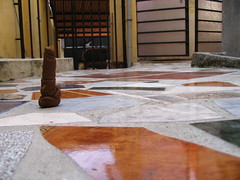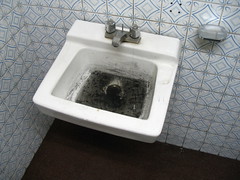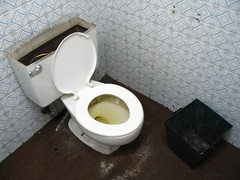At end service, there was a lot of talk about our re-entry into the States. People expressed their excitement and trepidation about going “home,” a concept which has now turned problematic for some of us. Some of the WorldTeach volunteers have lived in countries other than the US and Ecuador; I think for them, the talk about reverse culture shock and re-entry was a little boring and tedious, just as all the talk about teaching is sometimes boring and tedious for me. I also think that for those who grew up in a different country, culture shock and reverse culture shock are different animals.
At one point, we were assigned the task of deciding upon the top five most impacting changes of our lives and drawing a little timeline of it. I drew my timeline and then paired up with Jessie to talk about it. We had both put high school and college on our lists, the commonality being that in both situations, you are allowed an opportunity to create a different identity for yourself. You get into high school and you’re no longer so nailed down into the role you had in middle school. Similarly, in college, you now have a new opportunity to explore other facets of yourself. Many people go on with this search after college, becoming a ski bum, or traveling in Europe, or some other cliché of American soul-searching. When people go off on these missions to “find themselves” it’s seldom a spiritual journey. It’s usually an attempt to find people who accept them, or to become a person who people will accept.
We latch onto acceptance so tightly. At end-service, you could see how people pretty much sat with and conversed with friends from their site placements. Sometimes you could look around and point at different sections of the table and say, “those are the Manta people, those are the Quiteños, those are the Cuencanos, there are the Guayacos,” etc. Again, I come back to my main thesis about what living in Ecuador has taught me about the US: In the States, being cool is paramount; you have to struggle to fit in, to be popular, to be accepted. Here, people are more family oriented and so they have that acceptance automatically. Changing oneself to become popular with friends doesn’t make as much sense.
If you’ve grown up in the states, this aspect of the culture is a part of you. More so than American ideals of female beauty; more so than the “American dream” of wealth; it’s this aspect of our culture – this competitive popularity contest — that is the basis for the other cultural baggage. We are a culture which doesn’t provide people with acceptance, and so we must all vie for it. You find and stick with people who accept you because acceptance is so hard to come by.
And this is why for us Americans who have been affected by this culture of cool, the reverse culture shock of returning from a developing country (where acceptance is practically just your birthright) will be so difficult.
Let me give an example. When I went home back in December, I went to school and talked with some of my colleagues. One woman asked if I was dreaming in Spanish yet. And then practically before I could answer, another colleague of mine said, “well, when I went to Turkey, I was dreaming in this Turkish gibberish. I mean, it happens pretty fast.” Nevermind that her argument was absolutely stupid and ridiculous. Her point was to make my accomplishment seem less. She might as well have said, “oh don’t pay so much attention to him just cuz he went to a foreign country. Pay attention to me. I also went to a foreign country.”
That’s America. It’s this constant competition for acceptance.



